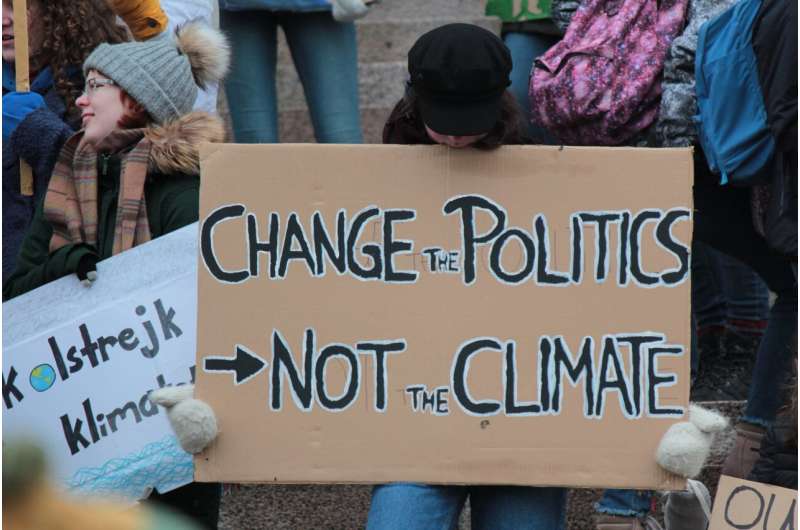This article has been reviewed according to Science X's editorial process and policies. Editors have highlighted the following attributes while ensuring the content's credibility:
fact-checked
proofread
'Elite versus people': Left-wing populism and environmental issues

Populist parties have been on the rise in recent years, and they are increasingly engaging with climate issues. While research and the media often focus on far-right parties, left-wing populist parties are also positioning themselves on climate protection. Laura Chazel (RIFS Potsdam) and Vincent Dain (Rennes I University) have analyzed the goals and discourse of two French parties in a new case study published in Political Studies.
"Left-wing populist parties are taking up environmental issues and using them strategically to sway voters. In France, this can be observed in particular with the party La France insoumise (LFI), which was founded by Jean-Luc Mélenchon in 2016. Competition between political parties and the growing importance of environmental issues led LFI to develop an ambitious green agenda," says Chazel. In the 2022 French presidential elections, LFI had considerable success with their strategy, winning over many former Green voters and securing 21.95% of the vote.
Inequitable burdens
Chazel and Dain analyzed a large number of documents of of Jean-Luc Mélenchon's parties, Parti de gauche (2008–2016) and La France insoumise (from 2016), including speeches by Mélenchon and the party leadership, blog entries, media interviews, party manifestos and election pledges. They also conducted interviews with party activists. A well-known feature of populist discourse cropped up repeatedly: the assertion of a fundamental opposition between the "people" and the "elite." La France insoumise blames the environmental crisis on "the oligarchy" and has formulated the goal of protecting the people with a green transition.
"LFI combines an eco-socialist ideology and anti-elitism to identify those responsible for the environmental crisis: capitalism and productivism, but also an irresponsible economic elite and a political elite that is guilty of inaction on climate change and subordinates the well-being of the people to the interests of multinationals," says Chazel.
According to the party, the people are penalized by the elite's "green policies" because the policies advantage the affluent and multinational corporations. Moreover, the party also upholds the vision of a virtuous "people" whose strength and collective action are the key to sustainable development.
Populism need not lead to rejection of climate protection
LFI, the authors argue, may be an extreme case, but further research would likely demonstrate some degree of "green populism" within other parties and intra-party currents as well, such as Spain's Más País party, founded by Íñigo Errejón in 2019, or Alexandria Ocasio-Cortez and like-minded politicians in the United States Democratic Party.
"The analysis provides new insights into the links between populism and environmental issues by showing that populism does not necessarily translate—as is the norm for far-right parties—into opposition to policies to protect the environment and combat global warming," Chazel explains. Left-wing populist parties emphasize the responsibility of the economic elite for the climate crisis or the inaction of the political elite on climate issues. At the same time, they praise "the people" not only as victims of the environmental crisis, but also as agents of green change.
More information: Laura Chazel et al, Left-Wing Populism and Environmental Issues: An Analysis of La France Insoumise's 'Popular Environmentalism', Political Studies (2023). DOI: 10.1177/00323217231178631
Provided by Forschungsinstitut für Nachhaltigkeit Helmholtz-Zentrum Potsdam





















